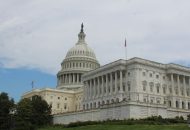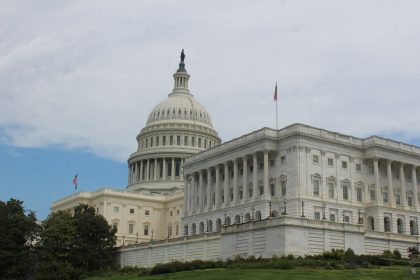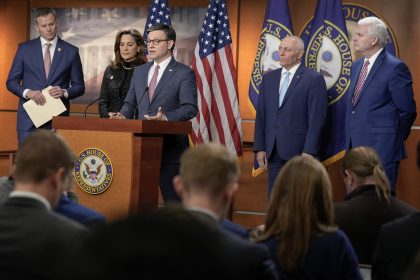As McCarthy Battles On, Scalise Lays Out Opening Weeks of 118th Congress

WASHINGTON — The first two weeks of a Republican-controlled House of Representatives will feature a hard tilt to the right with lawmakers voting on a number of messaging bills sure to make no headway in a Senate controlled by the Democrats.
The schedule for the first two weeks of the 118th Congress was released by House majority leader-elect Steve Scalise, R-La., on Friday afternoon.
In an accompanying letter to his GOP colleagues, Scalise spins the party’s failure to live up to expectations at the polls during the just-concluded midterm elections, and declares the vote gave the party a mandate to take the country in “a new direction.”
Scalise goes on to say the new leadership in the House intends to “change the way we do business in order to improve the legislative process.”
Proxy voting, then, a process in place since the earliest days of the coronavirus pandemic, appears to be on the way out.
“Returning to work in person, empowering each committee, moving legislation through regular order, encouraging member input, and allowing adequate time to read legislation will be major priorities of our incoming majority,” Scalise explains.
He then goes on to describe his newly announced agenda as “meaningful, ‘ready-to-go’ legislation” which should “provide an indication of our bold agenda to come.”
The resolutions to be voted on are:
- H.R. __ – Family and Small Business Taxpayer Protection Act. This bill rescinds tens of billions of dollars allocated to the IRS for 87,000 new IRS agents in the Inflation Reduction Act.
- H. Res. __ – Establishing the Select Committee on the Strategic Competition Between the United States and the Chinese Communist Party. This resolution establishes a bipartisan Select Committee on the Strategic Competition Between the United States and the Chinese Communist Party.
- H.R. __ – Strategic Production Response Act. This bill prohibits non-emergency drawdowns of the Strategic Petroleum Reserve without a plan to increase energy production on federal lands.
- H.R. __ – Protecting America’s Strategic Petroleum Reserve from China Act. This bill prohibits the Secretary of Energy from sending petroleum products from the Strategic Petroleum Reserve to China.
- H.R. __ – Prosecutors Need to Prosecute Act. This bill creates transparency in our criminal justice system by letting the public know how many cases prosecutors are declining to prosecute, the number of offenses committed by career criminals, and the number of criminals released.
- H. Con. Res. __ – Expressing support for the Nation’s law enforcement agencies and condemning any efforts to defund or dismantle law enforcement agencies. This resolution expresses the sincere gratitude and appreciation of Congress to the nation’s law enforcement officers who protect and serve our communities and rejects the efforts to defund and dismantle the nation’s law enforcement agencies.
- H.R. __ – Border Safety and Security Act.. This bill empowers the Department of Homeland Security to turn away illegal migrants at the border if the Secretary of DHS does not have operational control.
- H.R. __ – Illegal Alien NICS Alert Act. This bill requires the National Instant Criminal Background Check system to notify U.S. Immigration and Customs Enforcement and relevant local law enforcement when a firearm transferee is illegally present in the United States.
- H.R. __ – No Taxpayer Funding for Abortion and Abortion Insurance Full Disclosure Act. This bill makes permanent the long-standing Hyde Amendment as well as similar provisions to prohibit federal funding for abortion and funding for any insurance plan that includes abortion on demand.
- H. Con. Res. __ – Expressing the sense of Congress condemning the recent attacks on anti-abortion facilities, groups, and churches. This resolution expresses the sense of Congress condemning the recent attacks on pro-life facilities, groups, and churches, and
- H.R. __ – Born-Alive Abortion Survivors Protection Act. This bill ensures that infants born alive after an abortion receive the same protection of law and degree of care as any newborn.
In addition to passing this legislation, Scalise said the chamber’s oversight committee’s are “beginning their plans” to bring “much-needed accountability to the Biden administration.”
But while the new majority leader-elect has announced his plans, much about what will transpire once the new Congress convenes on Tuesday, Jan. 3, remains up in the air.
At the top of that list is the fate of the bid by Rep. Kevin McCarthy, R-Calif., to finally become speaker of the House.
Heading into the New Year’s weekend, McCarthy still faced a challenge from Rep. Andy Biggs, R-Ariz., chairman of the House Freedom Caucus, and at least four other GOP House members have said they intend to vote no on McCarthy.
If they do, and with Republicans holding only 222 seats, McCarthy could be denied the gavel, just as he was in 2015.
If that happened, the door to Scalise, who for now says he’s firmly in McCarthy’s camp, could begin to open.
But things appeared to get precipitously worse for McCarthy between Friday and Sunday night.
Late Saturday afternoon, McCarthy offered what his detractors called “his first comprehensive, written response” to rule proposals the Freedom Caucus believe must be championed to anyone wanting their support for the speakership.
Then on Sunday, he followed up on his written response, entitled “Restoring the people’s House and ending business as usual,” with a private conference call.
During that call, he reportedly finally agreed to give in to one of the Freedom Caucus’s main demands — that the threshold for triggering the ouster of a speaker be reduced from half the Republican conference — the number formally agreed to — to just five members dissatisfied with the speaker’s performance.
The conservative GOP holdouts have said they want to restore the previous rule that permitted such a vote if requested by a single member, but even reducing the number to five was a major concession on McCarthy’s part.
If he went to bed thinking he’d offered up enough red meat to make House conservatives happy, however, he was quickly disabused of that notion by a letter, signed by his five original detractors and four more members of the conference.
In a two-page letter, Republican Reps. Scott Perry, of Pennsylvania, Chip Roy, of Texas, Paul Gosar, of Arizona, Dan Bishop, of North Carolina, Andy Ogles, of Tennessee, Andy Harris, of Maryland, Anna Paulina Luna, of Florida, Andrew Clyde, of Georgia, and Eli Crane, of Arizona, said they welcomed McCarthy’s “telling” admission of longstanding and “deep dysfunction” in the House and his aspirations to begin to “set it right” in the 118th Congress.
“Regrettably, however, despite some progress achieved, Mr. McCarthy’s statement comes almost impossibly late to address continued deficiencies ahead of the opening of the 118th Congress on Jan. 3,” the representatives said. “At this stage, it cannot be a surprise that expressions of vague hopes reflected in far too many of the crucial points still under debate are insufficient.
“This is especially true with respect to Mr. McCarthy’s candidacy for speaker because the times call for radical departure from the status quo — not a continuation of past, and ongoing, Republican failures,” they said.
“For someone with a 14-year presence in senior House Republican leadership, Mr. McCarthy bears squarely the burden to correct the dysfunction he now explicitly admits across that long tenure,” the representatives continued. “Thus far, there continue to be missing specific commitments with respect to virtually every component of our entreaties, and thus, no means to measure whether promises are kept or broken.
“Moreover, some in the Republican conference have expressed that absent universal support for Mr. McCarthy, they would reject even the progress made to date regarding rules and changes to bill text availability, single subject and germaneness requirements, and other structural changes for the good of the body and every member.
“Mr. McCarthy’s statement also continues to propose to restrict the availability of the traditional motion to vacate the chair as a means of holding leadership accountable to its promises; we have from the beginning made clear that we will not accept following Nancy Pelosi’s example by insulating leadership in this way. We also note that the statement fails completely to address the issue of leadership working to defeat conservatives in open primaries,” they said.
Despite the continued opposition, McCarthy assured those on the call that he’s “slowly” closing the support gap and expects to have all the votes he needs by the time the chamber votes on its new speaker on Tuesday.
As for the Democrats, Rep. Hakeem Jeffries, D-N.Y., will formally take over as leader of the House Democrats on Tuesday, after Rep. Nancy Pelosi, D-Calif., stood down last year from the leadership position she had occupied since 2003.
Democrats, of course, retained their 50 seat majority in the Senate, after all incumbents won reelection and Sen.-elect John Fetterman flipped Pennsylvania.
But the party’s expectations of an expanded margin were thwarted when Sen. Kyrsten Sinema, I-Ariz., left the caucus to become an independent.
In its waning days in power, the party also rejected a proposed rules change that would have introduced six-year term limits for committee leadership posts.
In a related move, the House Democratic Steering and Policy Committee chose Rep. Rick Larsen, D-Wash., over Del. Eleanor Holmes-Norton, to be ranking member of the Transportation and Infrastructure Committee, and Rep. Jamie Raskin, D-Md., over Rep. Gerry Connolly, D-Va., to be ranking member of the House Oversight Committee.
The selections are noteworthy because both Raskin and Larsen are junior to the colleagues they ran against for their respective posts — continuing the Democrats trend toward a new leadership.
The speaker election aside, the new Republican majority is also expected to take up adoption of the new rules of the House as one of its first actions.
Typically, according to the Congressional Research Service, the package of rules the House adopts is similar to the rules adopted in the previous Congress, with certain amendments to previous practices and procedures.
In addition to rules related to floor and committee procedures, recent rules changes have also addressed more administrative or operational changes — for example, related to access or use of the Hall of the House, member records, access to the floor by staff and former members, use of electronic devices on the floor, public availability of certain documents, and employment policies.
The change in party control may also result in a change in some of the officers and other officials of the House.
These positions include those of the clerk, sergeant at arms, chief administrative officer and chaplain.
Also awaiting appointment by the new Congress are the parliamentarian, general counsel, legislative counsel, historian, and head of the office of Interparliamentary Affairs.
Another issue that will have to be addressed in the near-term is the overall level of staffing in the new congress — particularly in leadership, committee and support offices.
Under House Rule X, clause 7, committees have interim funding authority through March 31 of the first session of a new Congress.
During the interim period following a change in party control, the payment of committee expenses is approved “by the ranking member of the committee, as it was constituted at the expiration of the preceding Congress who is a member of the majority party in the present Congress,” the Congressional Research Service says.
Sometime in the next few weeks, the House will likely consider an omnibus committee funding resolution reported from the Committee on House Administration establishing funding levels for committees for each session of Congress.
“Although the details have varied over time, the principle of a two-third, one-third split between majority and minority funding and staffing on committees dates to the Legislative Reorganization Act of 1970,” the Congressional Research Service says.
Prior transitions also have resulted in changes to, for example, authorization and oversight plans and office transfers between the incoming majority and minority.
House Rules VII and XI govern the preservation of committee records, in paper and electronic form, and the transfer of any noncurrent committee records to the Clerk of the House for transfer to the National Archives and Records Administration. While these rules are longstanding, they may bear particular importance when committee leadership changes.
Dan can be reached at [email protected] and at https://twitter.com/DanMcCue
























